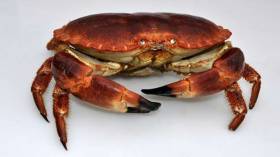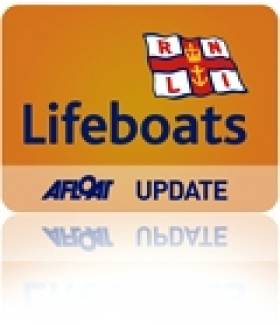Displaying items by tag: crab
Is This The Biggest Crab Ever Captured in Irish Waters?
A rare Box Crab with over a 9-foot leg span was caught off the Irish coast by Deividas Uosis and Niall Flannery from the fishing boat Barnacle II.
The giant crab was presented to Dr Kevin Flannery, a marine biologist with Oceanworld in Dingle, County Kerry.
Box crabs are common on shallow sandy flats and in sandy patches on coral reefs. They spend much of their time buried in the sand with only their sensory structures and respiratory openings at the surface. When foraging for food they walk freely over the bottom on sharply pointed walking legs.
Box crabs are named for their distinctive shape and design. Their rounded, dome-shaped carapace is usually broader than it is long with wing-like side extensions that conceal the four pairs of walking legs.
The broad, flat claws are held like shields, protecting the crab’s front surface and completing the box-like appearance. The claws’ shielding posture gives rise to another common name for this group, “shame-faced crabs”.
Concerns About Brown Crab Stock Management as Prices Rise
Marine specialist Dr Kevin Flannery has called on Minister for Marine Michael Creed to show “leadership” on managing the brown crab fishery before the stock collapses writes Lorna Siggins
“Inaction” by Mr Creed will result in many small vessels going to the wall unless a management plan is introduced, Flannery warns.
Brown or edible crab (cancer pagurus) and lobster are not covered by EU total allowable catch provisions, and landings are primarily managed through minimum landing size restrictions.
The rising price fetched for crab has resulted in a substantial increase in effort, particularly off the south-west, according to Flannery, who is a member of Ireland’s south-west regional inshore fisheries forum.
“You have up to 75 per cent of the Irish fleet now potting, and yet we have no patrol vessel that can haul a pot,” he says.
Figures from Bord Bia, show that the total crab exports to China in 2018 reached a value of €16.4 million. The average unit price per tonne was €7.9k, an increase of 32% on 2017.
"75 per cent of the Irish fleet are now potting yet we have no patrol vessel that can haul a pot"
“The price of brown crab has gone from 1.20 euro a kilo to 5 euro a kilo, but this has led to a bonanza which is not good for the stock – or for those who have invested in pots when there is no adequate management,”Dr Flannery says.
Earlier this month, a south-west Irish seafood company confirmed it had secured a 500,000 euro deal with supermarket chain Lidl to supply 800 of its Spanish and Portugal outlets with brown crab.
Shellfish Ireland in Castletownbere, Co Cork, which says it processes 1.5 million kilos of crab annually, employs about 150 people in the west Cork fishing port.
National lnshore Fisheries Forum (NIFF) vice-chairman Eamon Dixon said that the issue was complex, and one which might require co-operation with Britain and France as brown crab is a shared stock.
Mr Dixon said good work had been done in managing a biologically sensitive area extending from Clifden, Co Galway, to Co Waterford, but a full stock assessment was required to come up with a management plan.
Earlier this year, Mr Creed introduced a minimum conservation reference size for brown crab landings, increasing the minimum size to 140mm to allow more time for stock to reproduce.
Mr Creed closed the crab fishery for three months from January to March this year, on foot of an Irish quota management advisory committee recommendation, his department points out.
His department said that the NIFF was holding a series of meetings to come up with a management recommendation.
However, Dr Flannery said it was unfair to expect stakeholders to come up with a management regime without department leadership and a “rapid solution”.
The Marine Institute says that the minimum size increase to 140mm enabled better spawning levels, as maturity is on average 120mm.
However, it said that “no analytical assessments are undertaken” and “methods for assessment of poor stocks continue to be explored”.
Northern Ireland’s Department of Agriculture, Environment and Rural Affairs has recently initiated a consultation on managing the brown crab.
The Northern Irish authority said this was in response to industry concerns about the health of the fishery, which recorded landings in ports worth over £1.239 million in 2017.
RNLI Bangor Lifeboat launched to Assist Crab Fishing Boat
RNLI Bangor Lifeboat launched at 1:20 pm on Monday 17th January to assist 1 person aboard a 21ft crab fishing boat which had experienced gearbox mechanical failure close to shore.
Within minutes of the rescue pagers being activated, volunteer crew had launched RNLI Bangor Lifeboat and quickly located the crab fishing boat close to shore near Ballymacormick Point which is 1 ½ nautical miles north east of Bangor Harbour.
Calm weather conditions had allowed the skipper of the fishing vessel to make emergency repairs to the gearbox.
RNLI Bangor Lifeboat escorted the fishing vessel to the safety of Bangor Harbour and assisted the skipper with docking manoeuvres.
This is the first rescue call for RNLI Bangor Lifeboat in 2011.
Related Safety posts
RNLI Lifeboats in Ireland
Safety News
Rescue News from RNLI Lifeboats in Ireland
Coast Guard News from Ireland
Water Safety News from Ireland
Marine Casualty Investigation Board News
Marine Warnings

























































